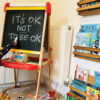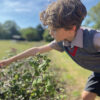by Fiona Edwards
Little Dippers
Baby swimming has become increasingly popular over the last 10 years and with good reason. As one of the first activities you can do with your new baby it not only gives you special one on one time with your baby, but also imparts your baby with a skill for life.
But taking that first step into the pool with your baby definitely comes with its fair share of questions and nerves. What if they get cold? What if they cry? What about their ears? Rest assured your babies are so much more adaptable than you realise and swimming is a completely natural progression for them having spent nine months in the fluid environment of the womb.
What’s more, babies are born with a natural dive reflex action which means they are already fully equipped to go underwater. It is truly amazing to see your baby dive underwater for the first time and come up again completely unfazed!
 Safety
Safety
One of the first considerations for going baby swimming must be safety. With drowning still the third most common cause of accidental death in children, learning to swim must surely be a priority for all parents. Teaching your baby key water safety techniques and confidence in the water will give them skills that, if they should ever fall into a pool, lake, pond or even the bath, will mean that they won’t panic and can utilise the skills that they have learnt – which could potentially save their life.
Bonding
Baby swimming is a great way to spend special one on one time with your little one away from the intrusions of everyday life. This is a time when you can truly focus on just you and your baby. Plus the added benefits of skin on skin contact can help to regulate baby’s heart rate and breathing as well as making them feel secure. For mums, it can release hormones to help with breastfeeding and build the nurturing instincts. It’s also a great way for dads to get involved and enjoy special bonding time.
Physical and physiological benefits
The buoyancy of the water enables babies to use muscles they could never use on land and they love the sense of freedom to kick freely. Despite looking gentle, swimming is great exercise for your baby, helping to strengthen their heart, lungs and respiratory capacity which in turn aids the development of the brain.
In fact, the exercises taught in baby swim classes, kicking, reaching, learning and responding to commands, provide the perfect stimulation for your baby’s brain and helps to develop their cognitive skills and hand/eye co-ordination. It has also been proven that the combination of activities in the pool strengthens nerve pathways between the two sides of the brain, helping to store and retrieve information more effectively. All good for future learning!
What’s more, regular swimming can improve your child’s eating and sleeping patterns – surely a bonus for everyone!
Fun for all the family Swimming is great exercise for all the family and is something you can enjoy together even when babies are very little.
Parents’ confidence
Don’t worry if you are not confident in the water yourself, most baby swim classes take place in shallow pools and don’t require you to do much more than hold your baby. However nervous you may be feeling make sure you try to remain calm and keep a big smile on your face as your baby will pick up any apprehension that you may feel. It’s amazing watching parents’ confidence grow as they watch their babies thrive in the water.
 Meet new friends
Meet new friends
Besides learning key survival skills swimming is fun! Singing songs, splashing around, blowing bubbles and playing games, it’s an easy way for parents to get involved and meet new friends along the way. It’s best to go somewhere with small groups so that everyone can get to know each other and your baby will respond to other babies in the group and enjoy the clapping and splashing.
A few things to think about before you go swimming
You can start swimming with your baby from birth although most parents tend to wait until their baby is around six to eight weeks. Contrary to popular belief, babies do not need to have had their immunisations before coming to a pool.
It is best to book a course of baby swimming classes before you take your baby to the pool on your own, so that you can learn how to hold your baby
and exercises that you can practise with them. Smaller classes with groups of around six or seven in private pools provide a calmer quieter environment for you and your baby. Try to find warm water pools; babies can’t regulate their temperature so look for classes that take place in pools ideally heated to around 32 -34O C.
Before choosing a class think about your baby’s feed and nap times. A tired or hungry baby won’t enjoy their class and give yourself plenty of time to get to your class and get changed. It’s amazing how much longer everything takes with a baby in tow and you don’t want to start your class flustered and stressed.
You can help prepare your baby for lessons by having fun in the bath splashing, grasping toys and singing songs.
With all these benefits surely it’s worth taking the plunge!
Little Dippers have been teaching babies to love the water for 25 years.
Classes in lovely warm water pools in the North Laine and Patcham in Brighton with free drop in sessions.
Free trial available to book.
For more details check our website www.littledippers.co.uk or call 01273 229 390











